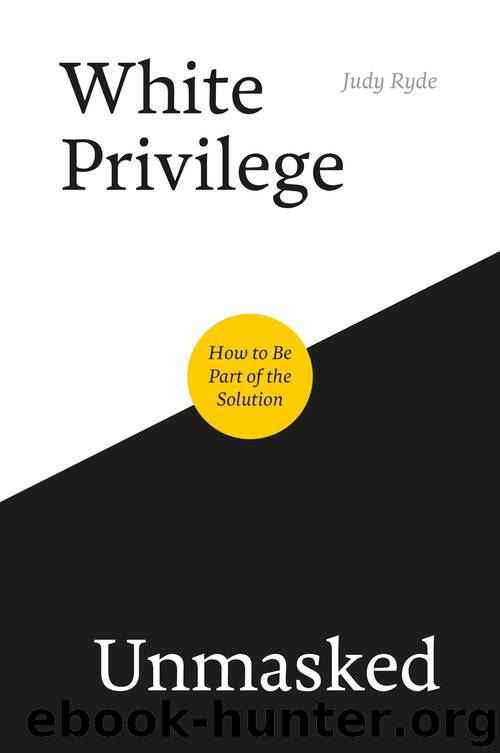White Privilege Unmasked by Judy Ryde;

Author:Judy Ryde;
Language: eng
Format: epub
ISBN: 9781784507671
Publisher: Jessica Kingsley Publishers
Published: 2019-02-09T16:00:00+00:00
1 www.bbc.co.uk/science/0/21970879
CHAPTER 8
Towards a Systemic and
Participatory Worldview
So far, I have established the following:
• White people are privileged because they constitute the norm in western countries and socially benefit from historically accumulated wealth.
• This can be denied for a variety of reasons.
• Attempts to tackle racism have not been successful.
So how can we be more successful in reducing denial and encourage a clear-sighted view of our own culpability as white people along with genuinely tolerant attitudes? One of the urgent issues of the day is how we reconcile apparently conflicting positions. This includes understanding each other’s cultural viewpoints but also addressing inequalities of power and wealth. Insisting on such egalitarian practices through rules and laws, and disparaging those who seem to be intolerant, is not working and, at times, is even counterproductive.
In view of the urgency of finding an answer to (racial) inequality in western societies and between nations worldwide, what will help us reconcile the difference between individualistic and collectivist cultures (see Chapter 5) which now encounter each other – and what will reduce the polarisation between the two?
It is my view that we need a complete change in the way we understand our world, a change in epistemology which views it as interconnected and interdependent even where we are apparently different. In this way, we might make more real headway in finding pathways towards reconciliation, which includes white people facing their privilege and accepting appropriate responsibility. This change towards a systemic epistemology is gaining recognition in fields as far apart as science, philosophy, psychotherapy and spirituality. Hawkins (2018) has written extensively about systemic thinking which, he says, shows how we cannot separate ourselves from our environment. He calls this way of constructing the world and our perceptions ‘participative systemic thinking’ and describes it thus:
[Participative systems thinking] arises from the realization that I can never see a system objectively, for by studying a system I create a new system which connects the studied and the studier, in which both affect the other. The bicycle and rider are affected by the audience that is cheering them on, timing their journey or asking them questions. You can never see the totality of a system that you are part of, for you will always see that system from the perspective of your position within it. (Hawkins, 2018)
Peter Reason, Emeritus Professor in the Business School of the University of Bath, who is also an ecologist and nature writer, uses the term ‘participatory world view’ (Reason, 1994), by which he means, one which sees that all is interconnected. We are not separate individuals, as is suggested in Descartes’ dualistic theory of ‘I think therefore I am’, stipulating an essential separateness between the subject and object of perception, but in systemic approaches, everything is intimately and inevitably part of the other. Those who accept a participative worldview know that I cannot view any part of the world without myself affecting it. Reason and Bradbury say: ‘Within this perspective, human persons are centres of consciousness both independent
Download
This site does not store any files on its server. We only index and link to content provided by other sites. Please contact the content providers to delete copyright contents if any and email us, we'll remove relevant links or contents immediately.
| General | Discrimination & Racism |
Nudge - Improving Decisions about Health, Wealth, and Happiness by Thaler Sunstein(7247)
iGen by Jean M. Twenge(5163)
The Fire Next Time by James Baldwin(5019)
Adulting by Kelly Williams Brown(4235)
The Hacking of the American Mind by Robert H. Lustig(4088)
The Sports Rules Book by Human Kinetics(4079)
The Ethical Slut by Janet W. Hardy(4040)
Captivate by Vanessa Van Edwards(3727)
Mummy Knew by Lisa James(3521)
In a Sunburned Country by Bill Bryson(3369)
The Worm at the Core by Sheldon Solomon(3325)
Ants Among Elephants by Sujatha Gidla(3280)
Suicide: A Study in Sociology by Emile Durkheim(2905)
The Slow Fix: Solve Problems, Work Smarter, and Live Better In a World Addicted to Speed by Carl Honore(2837)
The 48 laws of power by Robert Greene & Joost Elffers(2810)
Humans of New York by Brandon Stanton(2689)
Handbook of Forensic Sociology and Psychology by Stephen J. Morewitz & Mark L. Goldstein(2603)
The Happy Hooker by Xaviera Hollander(2584)
The Tipping Point by Malcolm Gladwell(2561)
